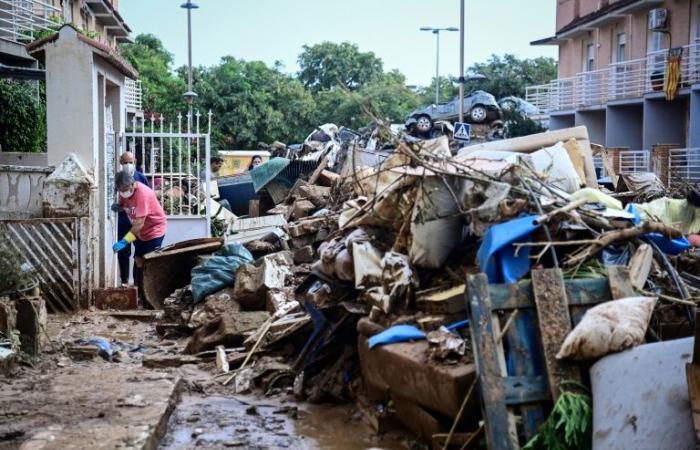Although it is still difficult to quantify, due to the scale of the damage, the cost of the deadly floods which affected the south-east of Spain promises to be astronomical. A challenge for the State and for the insurance sector, which bears the bill.
Buildings pulverized by the raging waves. Thousands of cars overturned on the road. Bridges and railways to be rebuilt. And many businesses brought down by bad weather, particularly in the agricultural sector…
In view of the “images of total desolation” coming from the affected areas, “we are going to face the most significant disaster ever known in Spain for a climatic disaster”, assured Mirenchu del Valle, president of the federation of insurers Unespa, on Monday.
“It is still too early to make estimates,” said Celedonio Villamayor, director of the Insurance Compensation Consortium (CCS), a public-private organization responsible for paying compensation in the event of a natural disaster.
But “we know that in economic terms”, this disaster “will certainly have a very high cost”, he continued, striving to deliver “a message of tranquility with regard to compensation and related indemnities to damage.”
For comparison, the cost of the floods of July 2021 in Western Europe (Germany, Belgium, France, Austria, Netherlands), which caused more than 200 deaths, had reached nearly 43 billion dollars (40 billion euros), according to the reinsurer Swiss Re.
– “Incalculable” consequences –
Whatever the final amount, the floods will weigh on the finances of the State and the Valencia region, by far the most affected by the bad weather.
The regional government has already announced an envelope of 250 million euros, with technical unemployment and support measures for businesses. With the central State, it will also have to finance the clearance and rehabilitation of roads and infrastructure.
At the end of a meeting with stakeholders on the ground Monday evening, the Ministry of Transport estimated the “necessary investments” to restore the transport network at 2.6 billion euros – a “provisional” assessment, a- he clarified.
But the bulk of the bill should fall on the insurance sector, which will have to compensate businesses and individuals.
According to the Valencia Chamber of Commerce, 4,500 businesses located on the ground floor could have been affected. Dozens of shopping centers and industrial zones were also affected, while transporters in the region lost numerous trucks.
On the agricultural side, the damage is also impressive, particularly in citrus fields, of which the Valencia region is one of the leading exporters. According to the regional agricultural union La Unio, 50,000 hectares of crops would have been affected.
In this sector alone, the cost could reach 150 million euros, according to an initial estimate from Agroseguro, the entity managing Spanish agricultural insurance. The losses are “catastrophic” and its consequences “incalculable”, insists the Asaja union.
– 400 experts sur place –
Economy Minister Carlos Cuerpo said that “400 experts” were deployed on the ground to assess the damage. He also specified that 46,000 requests for compensation had been sent by policyholders, an “unprecedented” level.
In Spain, insurers rely in the event of a natural disaster on a common guarantee fund, funded by a share taken from conventional insurance policies. A system that allows risk management to be distributed across the entire sector.
This fund is managed by the CCS, attached to the Ministry of the Economy. It is therefore this organization which will cover the majority of compensation – only peripheral damage, in areas not affected by the state of natural disaster, can be covered directly by insurance.
Will the CCS have the capacity to finance? Will it have to increase the amount taken from insurance policies? “He has reservations,” assures a sector specialist on condition of anonymity, who insists on the solidity of this model.
A message relayed Monday by the president of Unespa, Mirenchu del Valle: the system “is perfectly equipped to deal with this type of situation.”
Do you have a real estate project in mind? Yakeey & Médias24 help you make it happen!






